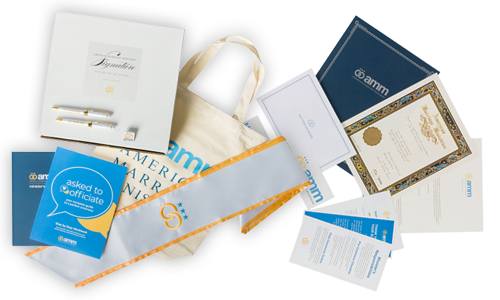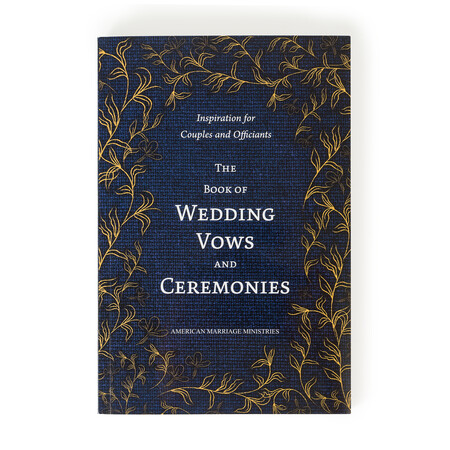How Do I As The Officiant Prepare For a Wedding in North Carolina?
Chances are good this will be the first wedding you officiate. This undertaking may seem daunting, as is doing anything for the first time. Not to worry, you are in good hands and we are here to guide you through this process.
By this point you should:
- Be an AMM Online Ordained Minister.
- Understand Your Officiant Registration Requirements in North Carolina.
If you have not done so yet, we recommend that you do so immediately.
Three Steps to Prepare for a Wedding Ceremony in North Carolina
We have broken down the officiant preparation process into three clear steps:
- Learn About Wedding Ceremony Terminology and Conventions.
- Write and Develop the Wedding Ceremony Script.
- Practice and Rehearse the Ceremony Script.
Continue reading for more information on each of these steps.
STEP 1 LEARN ABOUT WEDDING CEREMONY TERMINOLOGY AND CONVENTIONS
The first thing you should do is develop your wedding ceremony knowledge base. Lucky for you, this is not biochemistry. The information you need to internalize is simple and straightforward. So let's begin by asking a few basic questions.
WHAT IS A WEDDING CEREMONY?
This may be obvious but it is worth stating: A wedding ceremony is the ritual by which two people get married. This ritual has no legal requirements other than some states require it include a "Declaration of Intent".
The Declaration of Intent is the well-known part of the wedding ceremony where the officiant asks the couple if they want to marry each other. This is where you get to say the famous words, "Do you ... take ... to be your lawfully wedded... ".
One could argue that the Declaration of Intent is the defining feature of a wedding ceremony. No matter how wedding ceremonies are written or structured, they all contain some form of a Declaration of Intent.
Another way of understanding the wedding ceremony is that it is the performative, oral version of completing the marriage license. You are asking the couple to verbally declare they want to enter into the marital contract. In essence, this is the same thing as signing the marriage license.
For more information on basic wedding ceremony information, check out our page An Introduction to Officiating Wedding Ceremonies.
DOES THE NORTH CAROLINA GOVERNMENT REQUIRE THE CEREMONY TO BE WORDED IN A PARTICULAR WAY?
No. Although marriage is a government related legal contract, the North Carolina Government has nothing to say about how the wedding ceremony is to be structured or conducted.
The one exception, as we mentioned above, is that the wedding must contain a Declaration of Intent. However you can word the Declaration of intent any way you'd like as long as you ask the couple if they want to marry each other.
WHAT ARE THE PARTS OF A WEDDING CEREMONY CALLED?
Each part of a wedding ceremony has a name. As a wedding officiant it is important to familiarize yourself with all the parts of a wedding ceremony.
Our page The Parts of a Wedding Ceremony covers the seven essential parts of a wedding ceremony.
Strictly speaking, you do not need to have a vows or rings exchange. However that practice is so common we have included it as an essential part of a ceremony since the vast majority of wedding ceremonies include wedding vows and a rings exchange.
In short, the seven essential parts of a wedding ceremony are:
- The Procession
- The Invocation
- The Declaration of Intent
- The Vows Exchange
- The Rings Exchange
- The Pronouncement
- The Recession
Follow the links above for detailed information on each part of the wedding.
STEP 2 WRITE THE WEDDING CEREMONY SCRIPT
Now that you have an understanding of how a wedding ceremony is structured you should have a better idea of how to write a wedding ceremony script. Before you start writing however, it is a good idea to do more research. We recommend:
- Reflecting on your relationship with the couple.
- Reading other wedding ceremony scripts.
- Asking the couple about ceremony specifics: tone, wording, dress, length, extra ceremony parts, etc.
Taking these actions will help you in writing a ceremony that is heartfelt and tailored to the couple. The links above are from our officiant training guide, "How To Write a Wedding Ceremony Script in 9 Steps". We encourage you to read the entire guide.
When you are ready to start writing, you can use our Wedding Ceremony Template as a seed for your own ceremony. From here, you can reword and make the necessary changes to make the ceremony yours.
THE IMPORTANCE OF A THOUGHTFUL CEREMONY WRITING PROCESS
Keep in mind that writing a wedding ceremony is an iterative process. Block out a generous amount of time to work on the ceremony. This is important. The more time you put in, the better the end product will be.
And don't just do the rewrites on screen or paper. Recite the ceremony aloud to yourself. Listen to this advice! Following this practice will give you a new perspective on wording and ceremony flow.
For instance some phrases sound great on paper but feel awkward when spoken. Or a transition from one section of the wedding to another is not flowing well because the wording doesn't work. Again, acting out your ceremony will allow you to address issues you would have not noticed otherwise.
Remember, officiating a wedding is a performative act. A good officiant does not just read from a script. They are play a role -- to officiate, conduct, solemnize, marry. There are many words to describe this singular role you play in the wedding ceremony. But it boils down to, "You are acting, not reading.".
The point is that having an informed ceremony writing process will help you tremendously in crafting something truly special.
STEP 3 PRACTICE, PRACTICE, PRACTICE (AND REHEARSE)
If you have already gotten into the habit of reciting your ceremony while doing rewrites, you will have an advantage in transitioning to practicing for the ceremony.
You can have a lot of fun here. As you memorize and internalize the words, you can focus more on the tone of your voice, your demeanor, posture, what your hands are doing. This in turn will help you better internalize the script because actions will be paired to words.
INCORPORATE BLOCKING INTO YOUR REHEARSALS
Think of this as a piece of theater. In theater the term "blocking" is used when describing the physical actions and movements of the actors. Incorporate this technique into your own practice.
You know that one partner will be to either side of you with the audience directly in the middle. Think about this when reciting your script. Ask yourself, "When I say these words, who am I speaking to? Where should I look?".
When you are practicing, block out all of these events. How will you handle the ring exchange? What about a candle lighting ceremony? This is the time to start blocking out all of these events to ensure that they go smoothly for the actual ceremony.
INCORPORATE PROPS INTO YOUR REHEARSALS
We also recommend that you incorporate costumes and props. Especially props, namely a book or folder to hold. You will find comfort in holding a book even though you should not need it. You will likely use it as a "cheat sheet" though that should be the backup purpose. The primary purpose of the book is to give your hands a job.
We don't know why, but giving your hands a job when doing any type of public speaking can be really helpful. People that speak for a living, be it politicians, professors, preachers, or the TV news, all employ this strategy. Think microphone, desks, podiums,etc. These are all props that give their hands something to do, be it hold, clasp, grasp, or rest.
Going back to the ring exchange, this is another example of how using props can help better hone your performance. What if you are responsible for presenting the rings? Where are they? In your pocket? Which one? If you are holding a book? What are you going to do with the book when taking out the rings? Hold it with one hand? Which one? Put it under your arm? What if you're wearing a cassock for the ceremony but have practiced in a t-shirt? And you cannot tuck the book under your arm in the cassock!
This is all to underscore the importance of not just rehearsing the ceremony, but doing dress rehearsals. Developing a thoughtful and informed process to your rehearsal, and putting in the time, will ultimately lead to a better, more polished, and professional ceremony, both in word and in delivery.
Use Our AMM Wedding Helper
If the process of planning, scripting, and performing a wedding is daunting, then you need our Wedding Helper suite of tools.
We have distilled years of experience into an easy-to-use platform with training materials, quizzes, a personalized ceremony script generator, and tips to prepare you for performing marriage, all accessible through your minister profile.
That's only the beginning. After the wedding, you can share your wedding on the AMM Wedding Wall with our nationwide network of ministers.
More Officiant Wedding Ceremony Resources
Beyond writing the wedding ceremony, there are also other important logistics to consider. These include transportation, lodging, dress, and other details that need to be orchestrated. Check out our page "How to Prepare for a Wedding Ceremony" for more info on best practices to follow. Or tap the button below to learn more about officiating the wedding in North Carolina.
HOW TO OFFICIATE A WEDDING IN NORTH CAROLINA
ASKED TO OFFICIATE
If you are interested in a thorough resource that covers everything you could ever possibly want to know about officiating a wedding ceremony, we recommend purchasing a copy of our book Asked To Officiate. Originally written by two career wedding officiants, Asked To Officiate draws on their decades of experience officiating hundreds of wedding ceremonies.
Asked To Officiate is also included in our Signature Wedding Officiant Package. This package covers all the bases, including your Ministry Credentials, a Wedding Stole, Asked To Officiate, and your Minister's Manual.

 North Carolina MENU
North Carolina MENU




